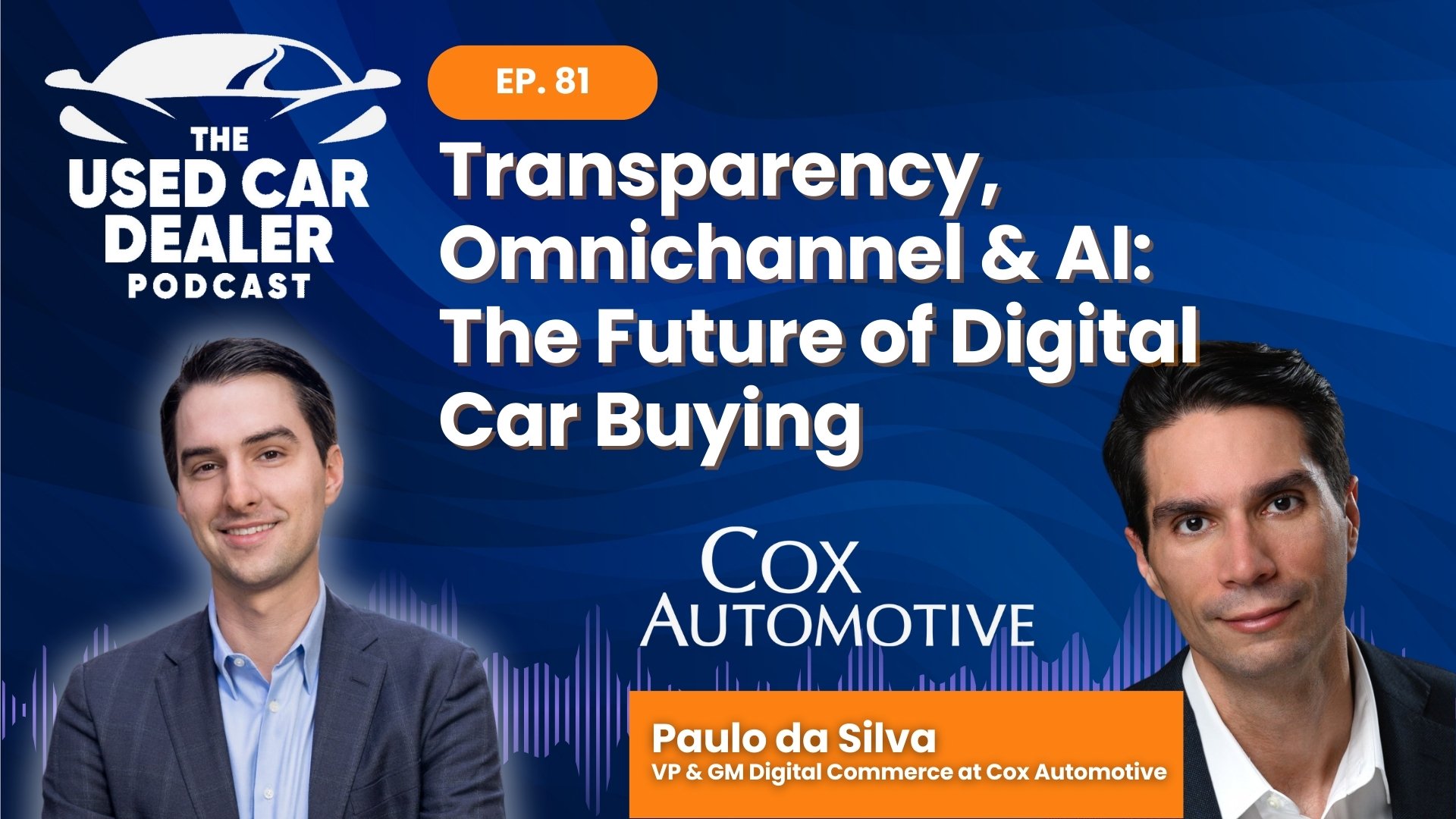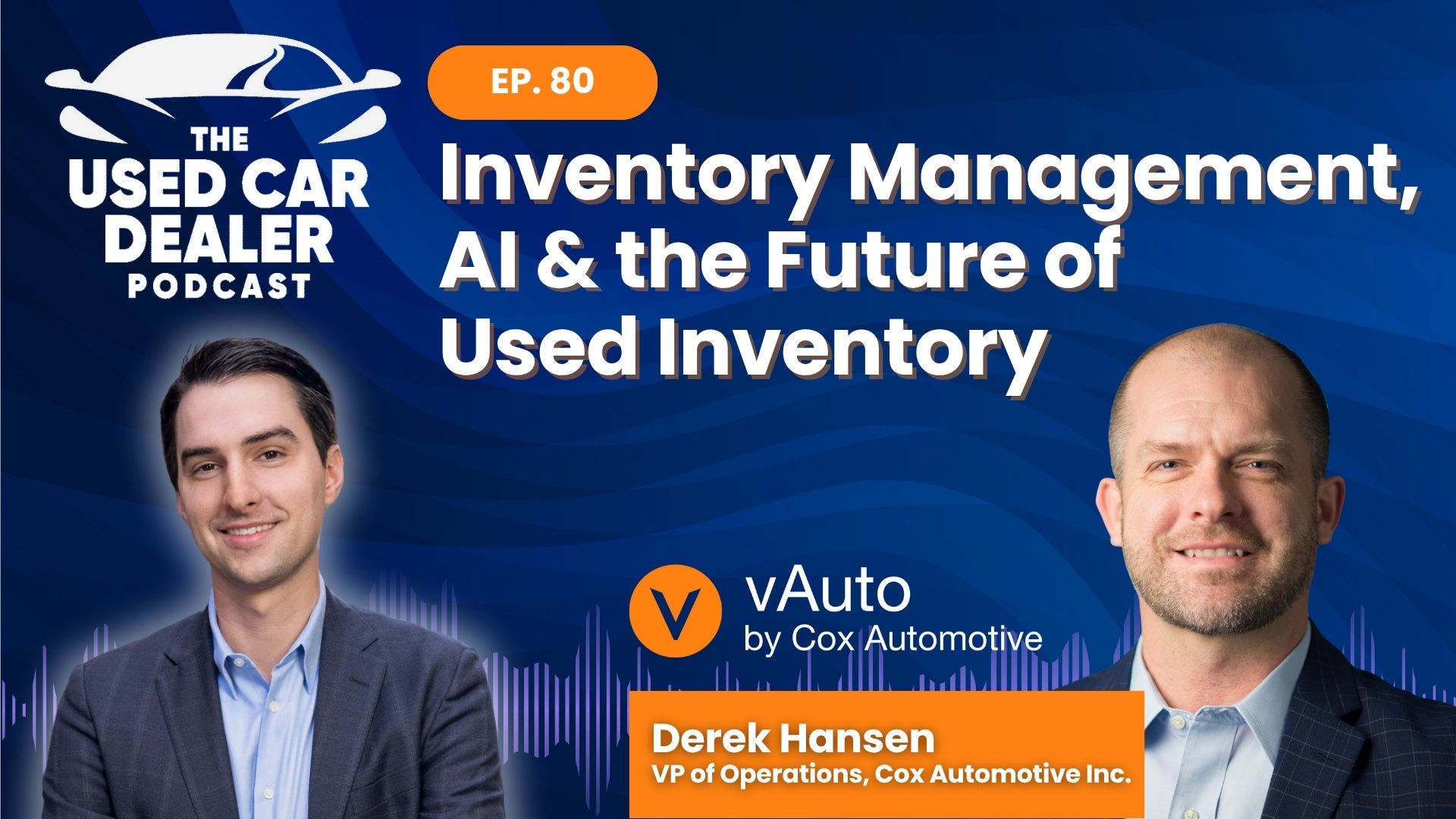In this episode transcript of the Used Car Dealer Podcast, Zach Klempf interviews Chris Lentz of AutoSweet.
Zach Klempf: Well, hello, Zach here, and we have a great guest on the podcast today, Chris Lentz, who's the CEO of AutoSweet. Chris, thanks so much for joining me on the podcast today.
Christopher Lentz: Hey, thanks a lot appreciate you having me.
Zach Klempf: So let's get started. And for those of us listening, talk about your previous experience as an auto industry entrepreneur before AutoSweet and how you got into the business?
Christopher Lentz: I did my first automotive website in 1994. And I remember being a little rough. But dealers were really trying to figure out how to take advantage of the audience that was growing on the internet. And then some of my dealer friends asked us to help. So at a high level, it's always been a core focus of mine, how can I help my customers solve problems? So we started there, building some websites, and then just kind of solved one problem after another. We would get a question, how do I get the right pricing and inventory on my website? So we built a DMS polling and inventory management system. And then I had a bunch of dealers ask, how do I handle these leads? And we built one of the first and best lead management systems in automotive, Web Control, which we grew to over 3500 customers, then, you know, how do I get the photos distributed? Everywhere I started, we built the platform for DIY on lot service and data distribution. And then finally, kind of where I'm at today with AutoSweet. Businesses started saying, can you help me sell more and measure the results? So I built a marketing platform, to put our dealers' products in front of a multitude of audiences on some of the most visited places in the US, Google, Facebook, Instagram, Craigslist, YouTube Offerup the list goes on. And with our long history of DMS integration and ROI reporting, we built the office suite marketing hub and utilized that data to do better marketing and measuring for marketing effectiveness.
Zach Klempf: And what was the initial problem in the industry that led you to start AutoSweet after already having an exit (selling another auto software company)?
Christopher Lentz: Well, you know, I started the marketing piece, because I think dealers often spend too much money with a spray and pray mentality or do what my competitor does mindset. We really like to consult with our dealers and find out what their real objectives are and what their budgets are. And we make sure that we're getting the most out of their marketing spend. So I really value and believe that our dealers value not wasting marketing dollars. So that was a big incentive for me.
Zach Klempf: So as we're battling inventory crunch in the industry and getting out of the pandemic, what have you observed from dealers, when it comes to the way they've changed their inventory marketing?
Christopher Lentz: Oh, well, a lot of marketing budgets have decreased. And with inventory levels being low, dealers seem hesitant to spend too much money. So our dealers still find that it's important to get their product in front of the consumers quickly. Cuz the consumers are buying fast and they are paying a premium for the inventory. Is that a bit that's available? So they are so my dealers are targeting their marketing budget to find the right low funnel opportunities, and they go for the right marketing channels are very targeted, and they make sure they get the most advertising for their dollar.
Zach Klempf: So how has Facebook grown over the last couple of years to become an important part of dealers inventory marketing?
Christopher Lentz: Well, first and foremost, I think Facebook, it's really the growth in their audience and they've given people a real reason to be on their platform daily. The US audience on Facebook is about 200 million, and there's another 170 million users on Instagram. People get their news there, they share their photos, they connect with groups that are important to them, and they interact with friends and family. I'm sure you do it, I do it. 73% of Facebook users login daily, and that number jumped at 93% in 2020, for obvious reasons. I can't stress enough that you just need to be there. They've really grown that audience so much that you should always be there and you should always find the right audience with your marketing. Automotive specifically though, I think Facebook's inventory, automotive inventory ads or AIA with the in app mobile experience. It's really just an easy and really the easiest way for a consumer to interact with the dealer. They've also focused on ways to find your audience, your DMS or your CRM holds a ton of first party data and Facebook's built incredible targeting and sales attribution tools to help you take advantage of that data. You should really be partly targeting that audience and utilizing look alike features to find consumers that are like those for me normally, so that was a big thing that Facebook did. And they've also made it really super easy to retarget audiences. You know that you retarget visitors with similar vehicles to vehicles that they actually visited on your website, which means they're more engaged, more likely to stay connected to your brand. With the normal buying cycle being about 90 days, reengagement until the point of purchase is fundamental. It's a fundamental automotive strategy that Facebook has completely embraced.
Zach Klempf: So shifting gears a little when it comes to Google AdWords, what are dealers missing out when it comes to running successful inventory marketing campaigns.
Christopher Lentz: I think a lot of small dealers are overspending. They don't really know what they're getting for what they spend. And the thing is, Google's the first place that many people go to search for everything. And we find that inventory specific searches drive traffic to the dealers vdps at a much lower cost than what most agency Google ads are hitting and running. So dealers need to challenge themselves or their agencies to find low funnel traffic, that's less than the industry average on the cost per click basis, and really less than $2 per click.
Zach Klempf: So for dealers listening, discuss the importance of joining an association, or 20 groups, or groups of dealers and how it could help them become successful.
Christopher Lentz: Associations are there to help you as a dealership and provide you exposure to the best tools on the market and the best practices. They provide reports that help you gauge how you're performing compared to your industry, and industry averages. They help you connect to dealers kind of nice social aspect to it, but really a learning aspect. They're trying to solve the same problem as you are. And so you get to talk to other people. I've been in business for 26 years. And I've always believed and lived by the idea that you don't find success without advice and help from others. So I highly encourage it.
Zach Klempf: So with dealers, putting a lot of marketing spend, whether it's Facebook, AdWords, their reputation online is really important. Why is reputation management important for dealers, especially in today's marketplace?
Christopher Lentz: Going back to my Google statement, that's the first place where people go to search for everything. And Facebook, that's where people are every single day on Google, my business is maybe the first exposure that consumer has to your brand, and your reputation scores. It's right there at the top, it's so easy to just click and review every review by dealership consumer, the good and the bad, the ugly. Consumers don't buy bad products, or buy from bad businesses. They trust the internet reviewers. So I say respond to your reviews, both positive and negative and find ways to build your reputation.
Zach Klempf: So what are your predictions for the rest of 2021? And what's coming down the pipeline?
Christopher Lentz: Well, I think one of the biggest things that dealers are going to have to contend with this year besides inventory shortages and the economy, is Facebook's change to organic marketplace. Data feeds to the marketplace will cease on September 13. While I can't speak to Facebook's reason for the change, even though Facebook partners, they don't really share that kind of stuff with us. I can say that individual dealers are regularly frustrated by organizations that post vehicles to Facebook marketplace that don't actually have vehicles in the actual market. So there's a lot of frustration about why this group posted my vehicles here. So marketplaces are supposed to be local first. And I believe Facebook may be aligned with that idea. And so limiting the data feeds that some organizations took advantage of by over saturating multiple markets, it makes the markets place itself better for consumers. And that should always be Facebook's number one priority, in my humble opinion. So I'm really glad they're doing this. And I think dealers should be excited about it, too. I think they should continue to win when they're given the toolset to do so post inventory selectively and take advantage of the paid promotional ads like AIA so that they keep their active inventory in front of those consumers like you would on any other marketing outlet. I know with certainty that AI has performed well in the marketplace, and our dealers are finding tremendous success with it. And I can also say that since we are also in auto, we help dealers post on Craigslist, we've seen this kind of change before and from our experience, I can say that it's good for the community, which is really important because it keeps people coming there. And it's good for the dealers that market to that audience because they're going to get better consumers.
Zach Klempf: So how does AutoSweet uniquely help independent dealers succeed in today's market?
Christopher Lentz: Well, like I said, for 25 years, I've been simply trying to help dealer solve problems and we can really help an independent dealer find effective marketing at the right price. We can market your inventory and your brand first. And our consultative approach ensures that you have someone that will meet with you regularly to adjust the changing marketplace. Things change all the time. The changing economy we had a lot of contact with our dealerships during COVID that was really helpful. And we try to find the newest opportunities to help ensure your marketing is successful. So whatever's new, we're going to help you do it. We really make marketing your inventory easy. We measure its effectiveness, which you, you really don't get with a lot of partners, you shouldn't spend your time learning how to advertise on every platform, you should work with someone that has proven automotive marketing tools that meet your goals and objectives. And we have some really straightforward programs that can take the pain out of setting up these campaigns and measuring them. So if you'd like to learn more, check us out AutoSweet.com, that's sweetlike candy, we always like to say and if you're at NIADA, we'll give you some candy. While you're at the show. I promise you that. But we talk to our people about a free marketing plan or schedule a demo and we can help you out.
Zach Klempf: Yeah, it's exciting. We're finally going back to in person conferences, you know NIADA is going to be one of the first for the auto dealer community. So really appreciate you Chris joining the podcast today. And thanks so much for your insight!
Christopher Lentz: Yeah, we're really excited to see our dealers again too. So I know you are and we look forward to seeing everybody there. And at the remainder of the shows this year. It's been a complete pleasure. And thank you very much for the opportunity.


.png)




.jpg)
.jpg)
.jpg)
.jpg)

.png)
.png)
